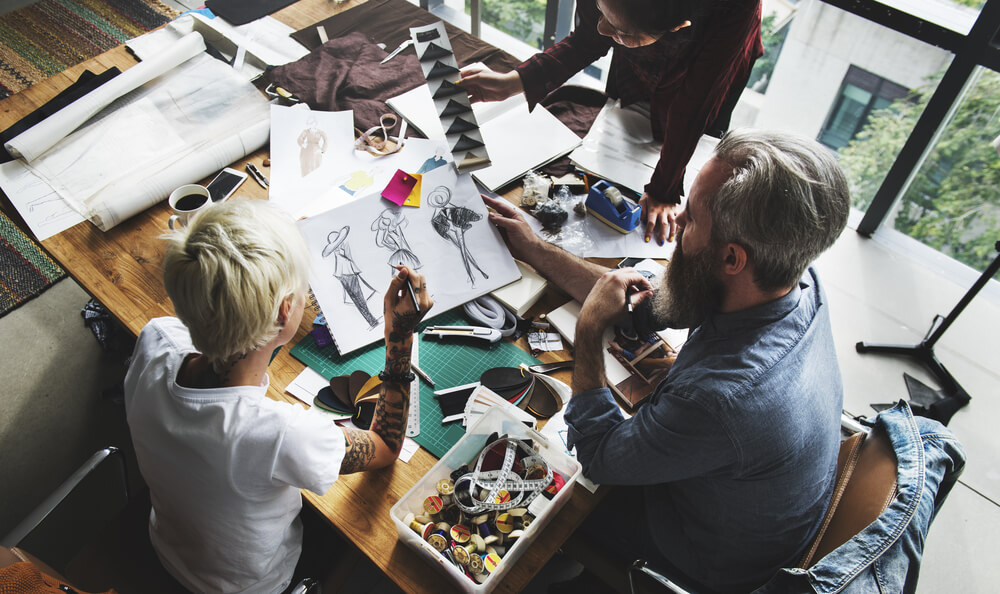What is a Fashion Designer?
As a fashion designer, you will utilise your creative and technical abilities to develop innovative clothing designs. Staying updated with the latest fashion trends and predicting the upcoming styles that will resonate with consumers is a crucial part of your role. Your knowledge of international fashion trends will serve as inspiration for your designs.
You will have the autonomy to select fabrics, colors, and patterns to create sample products, which you will revise until you are satisfied with the final design. Depending on the situation, you may either follow your own brief or receive one from an organisation. If you work for a larger organisation, you will likely be a part of a design team, and the creative director will provide the brief. Alternatively, working for a smaller company, you may be the sole designer and have complete control over the design brief and process.
Responsibilities
- Use hand-drawn or computer-aided design (CAD) to create and visualise fashion designs
- Create mood boards to present design concepts to clients
- Stay updated on fashion trends, including fabric, colour, and shape trends
- Develop fashion ranges based on themes
- Collaborate with other design team members (such as buyers and forecasters) to meet design briefs
- Communicate regularly with sales, buying, and production teams to ensure designs fit the customer, market, and price point
- Understand the technical aspects of design, including pattern-making and creating technical specifications for designs
- Attend trade shows and visit manufacturers to source and select fabrics, trims, fastenings, and embellishments
- Modify existing designs for mass production.
- Develop garment patterns and supervise the creation of samples, including fitting, detailing, and adjustments.
- Oversee the production of garments
- Negotiate with customers and suppliers
- Showcase designs at fashion and trade shows
- Work with models to showcase designs on the catwalk at fashion shows
- If working as a self-employed fashion designer, manage business activities, including marketing and finances.
Salary
The amount you earn as a fashion designer will be influenced by various factors including your level of experience, your location and the size of the company you work for.
According to Glassdoor, the national average salary for a fashion designer is £28,597. Salaries for design assistants tend to be lower, ranging from around £16,000 to £18,000. Once you progress to a junior designer position, you can typically expect to earn approximately £25,000. For senior designers and creative directors, salaries are usually higher, but this can vary greatly, with earnings falling in the range of £42,000 to £85,000.
Working hours
The number of hours you work as a fashion designer can vary depending on the project, but it’s important to note that you may be required to work extra hours in order to meet deadlines.
What to expect
- The working environment can differ between companies, ranging from modern offices to small design studios. Freelance designers may work from home or rent a studio.
- With the growth of online retailing, it is becoming increasingly common for designers to set up their own businesses or work as self-employed. However, market research and business skills are essential for success in the fashion industry.
- Most job opportunities are located in London, the South East, some large towns and cities in the North West and Scotland, with some industry clusters in the Midlands.
- Career success in fashion design relies on a combination of creativity, perseverance, resilience, good communication and networking skills.
Qualifications
To succeed in the competitive fashion industry, it is essential to have the right qualifications. Typically, a degree in a subject that combines technical and design skills is required, such as art and design, fashion and fashion design, fashion business, fashion buying, marketing and communication, garment technology, graphic design, or textiles and textile design. If your degree is in an unrelated field, gaining industry experience in areas such as fashion retail is essential before applying for a design role.

Skills
must have skills:
- Creativity
- Design and visualisation skills, whether by hand or using computer-aided design (CAD)
- Technical abilities, including pattern cutting and sewing
- A good eye for colour, fabrics, and materials
- A proactive approach and the ability to generate ideas and concepts
- Garment technology knowledge and skills
- Commercial awareness and a business-oriented mindset
- Self-promotion and confidence
- Strong interpersonal, communication, and networking abilities
- The ability to negotiate and influence others
- Teamwork skills
- Excellent organisation and time management skills.
Work experience
Gaining work experience is essential for entering the fashion industry and building a network of industry contacts.
You can find opportunities for work experience during your studies through internships, placements, and your student union. Volunteering at fashion events and attending trade shows can also be a great way to showcase your work and make valuable connections with potential employers and colleagues.
Employers
Fashion designers can work for a range of employers, including high-street clothing stores, independent labels, and specialist design studios catering to the couture and ready-to-wear markets. In order to secure a position with a top design house, extensive experience is typically required compared to working in the high-street fashion sector.
Professional development
- On-the-job training is essential to developing your skills as a fashion designer.
- Employers will provide initial training related to practical processes and technological developments.
- To stay ahead of the competition, it’s important to continue developing your career and skill set.
- Stay up-to-date with the latest trends and fashions by reading trade press and fashion blogs, attending trade and fashion shows, and visiting suppliers.
Career prospects
- Your career development in the fashion industry depends on factors such as your specialisation, work experience, and reputation. Opportunities provided by your employers will also play a role.
- Progression in the early stages of your career may be slow, but you can take proactive steps such as building contacts and seeking additional opportunities to enhance your skills.
- It’s important to build a portfolio of your work throughout your career, which will showcase your abilities and creative style.
- With several years of experience, it’s possible to progress to roles such as head designer or creative director, where you’ll have more control over design decisions and lead others in the design process.
Related Courses
The MBA component of the course takes a broad look at business practice and functions such as accounts, finance, and HR – and how they are all interlinked. This allows students to grasp the importance of strategy and communication within a managerial role.
Alongside a broad business view, this course allows students to specialise in digital marketing in a more focused way. The marketing aspect of the programme is intended to allow professionals with substantial digital marketing experience to hone their skills to enhance their career prospects. Areas of study include digital marketing strategy, management, social media marketing, search engine optimisation, pay-per-click, email and influencer marketing.
Other related courses include:
- MSc Marketing and Leadership
- MSc Strategic Marketing
- MSc Global Digital Marketing





